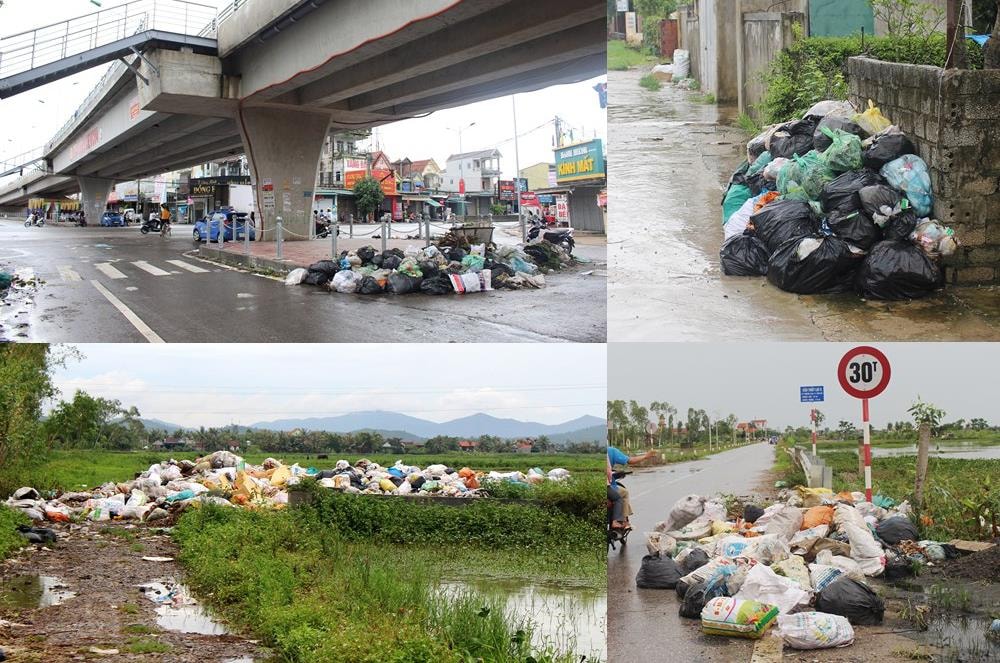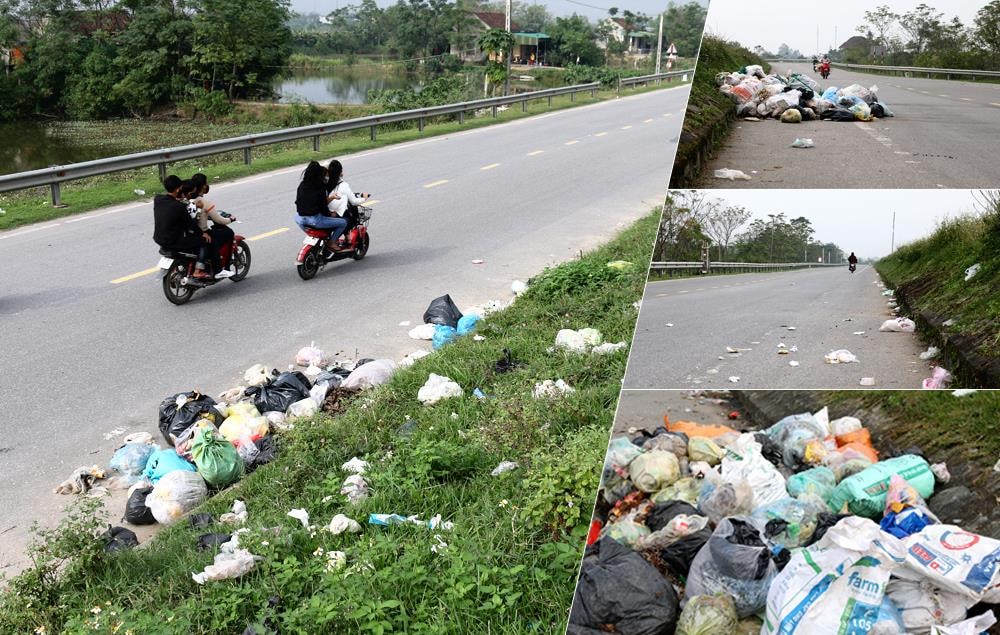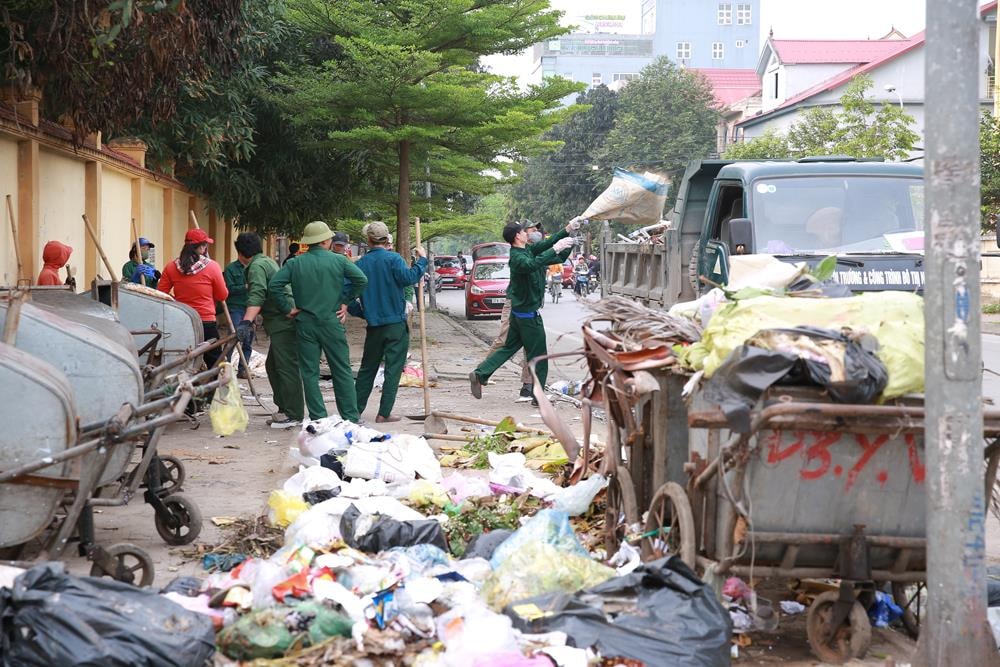How to manage and use garbage collection and transportation fees in Nghe An?
(Baonghean) - Due to the limited funding for waste collection and treatment in the area, while the provincial budget cannot handle it, the Provincial People's Committee will issue a maximum price for the collection, transportation and treatment of household waste in Nghe An province to replace the previous regulation.
Thai Binh Nguyen Environmental Company Limited is responsible for collecting and treating waste in 18 communes and towns of Quynh Luu district. Every day, the company has to collect 30 tons of waste and the current difficulty is that there is no waste factory in the area, so it has to be transported to Nghia Dan or Hoang Mai for treatment, so the cost is very high. Because these two factories require initial classification, while the waste in households is not classified. When there is waste that cannot be buried, the company has to bring it to the treatment factory and pay a treatment fee of 410,000 VND/ton, not including transportation costs.
Another difficulty is recruiting workers. If the salary is low, it is impossible to find people, but if the salary is high, it is not balanced. Mr. Ho Ngoc Thai - Director of the company said: Therefore, collecting a fee of 4,000 VND/person/month is not enough, so the company has to negotiate with the people to collect a higher fee.
 |
| The accumulation of household waste from Quynh Luu residents in large quantities has been reported recently. Photo: Tan Bao |
This is also the common situation in many localities in the issue of contracts for waste collection and treatment. Not to mention that in localities where there are waste treatment plants, there is no waste to treat because people find the treatment costs too high and do not cooperate.
Reality shows that regulating the maximum consumption price for collection, transportation and treatment of household waste is necessary so that localities and businesses can be proactive in developing collection and treatment plans.
According to the proposed draft price: Resident households that do not participate in business must pay 8,000 VND/person/month for wards and 5,000 VND/person/month for towns and townships and 4,000 VND/person/month for the remaining communes.
For production and service businesses that employ 4 or more workers and households that generate a lot of waste such as selling car tires, repairing cars and motorbikes, selling construction materials, ceramics, glass, processing agricultural, forestry, aquatic and seafood products, slaughtering livestock... the fee is 175,000 VND/household/month (wards) and 155,000 VND/household/month for communes.
Food and beverage businesses with revenue over 50 million VND/month, the fee is 350,000 VND/month, food and beverage businesses with revenue from 30 to 50 million VND/month, the fee is 300,000 VND/month; food and beverage service units with revenue under 30 million VND/month, the fee is 215,000 VND/month...
 |
| Recently, many points along the Lam River road through Hung Long commune (Hung Nguyen) have also been in a state of household waste congestion. Photo: Lam Tung |
With the maximum consumption price for garbage collection and transportation services mentioned above, it is basically kept the same as the current regulations, adding the maximum consumption price for garbage treatment services. In this price adjustment, with the additional regulation of garbage treatment prices, the total price for garbage collection, transportation and treatment will increase compared to the price for collection and treatment services stipulated in Decision No. 74/2016/QD-UBND.
After that, a roadmap will be implemented to increase service prices, moving towards compensating 100% of the costs of collecting, transporting, and treating waste in each locality, without any budget subsidy.
In 2019 and 2020, the service fee must cover about 70% of the costs of waste collection, transportation and treatment. For the remaining funding, the People's Committees of districts, cities and towns are required to prioritize allocation from the allocated environmental career funding source and balance the district budget for supplementation.
When collecting fees for collection, transportation and treatment of domestic waste in Nghe An province, units that create and use service provision invoices must comply with the provisions of law.
Revenue from providing services of collection, transportation and treatment of domestic waste in Nghe An province, after fulfilling obligations to the State budget according to the provisions of law, heads of agencies, units and individuals have the right to manage, use and regulate funds according to the provisions of law.
The unit that collects, transports, and treats domestic waste using the State budget in Nghe An province, based on the opinions of the People's Committees of districts, cities, and towns, shall prescribe specific prices for each area, ensuring that they are suitable to the economic and social conditions and the contribution capacity of the subjects in the area and do not exceed the maximum price as prescribed in Article 2 of this Decision.
 |
| Workers of Nghe An Urban Environment and Construction Joint Stock Company collect waste. Photo by Lam Tung |
People's Committees of districts, cities and towns, based on their assigned functions and tasks, shall direct, inspect, supervise the collection, payment and management of prices for collection, transportation and treatment of domestic waste in their areas of responsibility.
Organize collection, management and use of funds for collection, transportation and treatment of domestic waste in accordance with regulations.
During the period when service prices have not yet covered costs, it is recommended that the People's Committees of districts, cities and towns prioritize the use of environmental career funding sources and balance and arrange funds from the district budget to compensate organizations and individuals assigned or ordered to perform the tasks of collecting, transporting and treating domestic waste in the area.
The Provincial People's Committee assigned the Department of Finance to preside over and coordinate with relevant departments to advise the Provincial People's Committee to adjust the maximum consumption price for collection, transportation and treatment of domestic waste using State budget funds in the province when there are input factors that cause fluctuations in the costs of collection, transportation of domestic waste and treatment of domestic solid waste.

